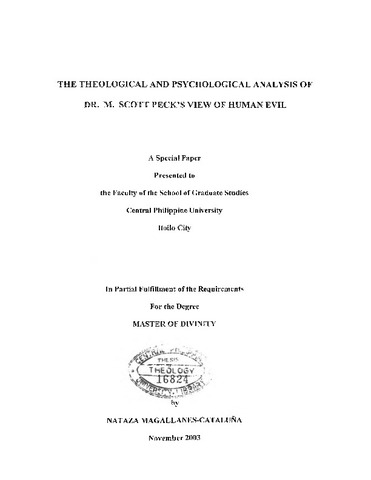The theological and psychological analysis of Dr. M. Scott Peck’s view of human evil
| dc.contributor.adviser | Diel, Domingo J. Jr. | |
| dc.contributor.author | Cataluña, Nataza Magallanes | |
| dc.date.accessioned | 2022-05-11T07:15:13Z | |
| dc.date.available | 2022-05-11T07:15:13Z | |
| dc.date.issued | 2003 | |
| dc.identifier.citation | Cataluña, N. M. (2003). The theological and psychological analysis of Dr. M. Scott Peck’s view of human evil (Unpublished Master’s special paper). Central Philippine University, Jaro, Iloilo City. | en_US |
| dc.identifier.uri | https://hdl.handle.net/20.500.12852/2049 | |
| dc.description | Introduction | en_US |
| dc.description.abstract | Objectives of the Study This special paper on the book People of the Lie aims to: a. arouse the awareness of the readers on the reality of the existence of human evil. b. impart knowledge on the nature, the source and the healing of human evil. c. encourage the readers to undergo the process of introspection and find healing for themselves. d. provide a re-orientation of the readers’ perspective on the integration of Science and Religion in the arena of healing. Significance of the Study The author’s content analysis will benefit those who are victims of human evil, in the hope that they too can name their own experience and find healing as they delve into this subject. It will contribute to the realization of theology and medical students to bring to light the value of integrating Science and Religion in the healing process as the issue of human evil is discussed openly in the classroom. Furthermore, the analysis of this study can propel them to embark on an intense research related to the issue of human evil and contribute to public awareness. Likewise, it will educate church persons so that they will not remain in their fairy tale view of evil but will comprehend evil’s true nature. Scope of the Study This study focuses only on what Dr. Peck calls human evil. The writer of this special paper will deal on the subject psychologically and theologically. This paper proposes to explore the following questions: a) who are the people of the lie? b) where did its deviltry come from? c) who arc their victims? d) is their nature a kind of illness? e) do they suffer? f) is there healing for its evil? The second chapter will set the stage for unveiling Dr. Peck’s definition of human evil and its characteristics. It will deal with a) its genesis and effects on its victims; b) the methods of Peck on how to deal, heal, and exorcize it; c) and his recommendations for further studies over the subject matter. The third chapter focuses on the writer’s analysis. It explores some truths upon gathered opinion from different authors that deal with the issue of evil as well as other relevant issues. It also conveys her theological reflection concerning the integration of Science and Religion as well as the issue of human evil in the realm of politics. In the last chapter, the writer of this paper discusses her concluding thoughts toward the study, as well as her own recommendations. | en_US |
| dc.format.extent | 93 leaves | en_US |
| dc.language.iso | en | en_US |
| dc.subject.ddc | TheoLib Thesis 207.2 C28 | en_US |
| dc.subject.lcsh | Good and evil | en_US |
| dc.subject.lcsh | Good and evil--Religious aspects--Christianity | en_US |
| dc.subject.lcsh | Good and evil--Biblical teaching | en_US |
| dc.subject.lcsh | Good and evil--Religious aspects | en_US |
| dc.subject.lcsh | Peck, M. Scott (Morgan Scott), 1936-2005 | en_US |
| dc.title | The theological and psychological analysis of Dr. M. Scott Peck’s view of human evil | en_US |
| dc.type | Special paper | en_US |
| dcterms.accessRights | Not publicly accessible | en_US |
| dc.description.bibliographicalreferences | Includes bibliographical references | en_US |
| dc.contributor.chair | David, Fely P. | |
| dc.contributor.department | School of Graduate Studies | en_US |
| dc.description.degree | Master of Divinity | en_US |
이 항목의 파일
This item appears in the following Collection(s)
-
Master of Divinity [35]


